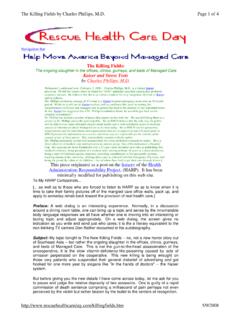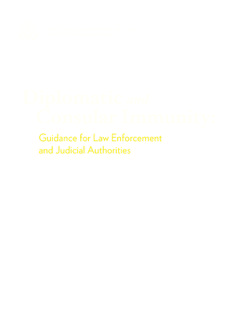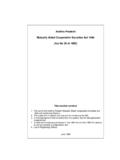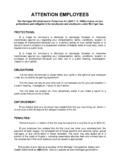Transcription of The Health Care Quality Improvement Act of 1986 and ...
1 The Health care Quality Improvement Act of 1986 and Physician Peer Reviews: Success or Failure? By: Bryan G. Hall The Master Said to Narendra: Have you become an experienced physician? Quoting a Sanskrit verse he said, He who has killed only a hundred patients is a novice in medicine; but he becomes an expert after killing a thousand. - Ramakrishna Abstract In the early 1980 s, in response to numerous newspaper articles reporting cases of physician ineptitude, the medical community increased its efforts to limit the practice of incompetent physicians through the implementation of professional peer review and credentialing procedures for a physician s obtaining of hospital privileges and membership.
2 However, as the decade progressed, the success of the peer review process became hindered by an increase in lawsuits filed by the disciplined physician against the individual review committee and hospital. In response to this increase in litigation, the Health care Quality Improvement Act (HCQIA) of 1986 was passed by Congress with the expectation that it would help protect hospitals and individual s participating on medical peer review committees from potential liability in the form of money damages after the revocation of a physician s hospital privileges . The Act has established standards for the hospital peer review committees, provides immunity for those involved in peer review, and hascreated the National Practitioner Data Bank, a system for reporting physicians whose competency has been questioned or when the physician has been sanctioned.
3 The effect of HCQIA on many of those that have been on the receiving end of a bad faith peer review committee has been unjust and unfair. Critics argue that the HCQIA helps foster an environment in the community that, instead of promoting the goal of Quality Health care in America, allows the peer review process to be perverted for political and economic motives. This report will analyze the current peer review process and the importance of hospital privileges , the standards and immunity provided by the Health care Quality Improvement Act, as well as a critique of the Act regarding its protection of bad faith or malicious peer review committee.
4 This report will also offer some suggested remedies in order to ensure a more equitable and just peer review system and thus help realize the primary goal of the Act, the implementation of the best Quality Health care system possible. Introduction The doctor under the microscope. Such is the position felt by many physicians who are scrutinized by hospital peer review committees. It is argued by some that due to state law and the passage of the Health care Quality Improvement Act of 1986, medical peer review committees have become prone to misuse by those with a vendetta or dislike for the reviewed physician, and thus the primary purpose of the Act to attempt to guarantee the best Quality Health care system possible - has become tainted and perverted.
5 As children, we are told that sticks and stones may break your bones, but words will never hurt you. However, this sentiment is untrue in the professional world, where negative words, justified or not, that are reflected in a medical peer review can potentially have a horrible effect on a physician s reputation and adversely affect his or her professional and economic opportunities. A hypothetical case has been advanced: Dr Amelia Adams, fresh from medical school and a successful residency, began her profession as acardiologist with an established Health maintenance organization (HMO).[1] While working hard as the third member of the team of cardiologists, Adams began to realize that the training of the other doctors was out of date, by much as twenty years.
6 [2] As a way to help her colleagues, without embarrassing any of the older physicians by pointing out their outdated methods, Dr. Adams began an informal training program on the new trends and techniques in cardiology.[3] However, the senior cardiologist felt the new techniques were too expensive, and they were summarily rejected.[4] Disappointed and discouraged at the decision, Dr. Adams became very blunt in expressing her disappointment, and as a result of her outspoken attitude, Dr. Adams began to be viewed as a threat by the senior medical staff.[5] Indeed, other cardiologists began to refuse to do rounds on her patients, and began to spread false rumors as to her competency and ultimately, the senior physician publicly ridiculed her for an isolated incident concerning aprocedure that Dr.
7 Adams had completed that had led to nonfatal complications for the patient.[6] Later, Dr. Adams was confronted by the senior staff and was asked to resign her position in the department; she refused to voluntarily resign, and was subsequently threatened with an ad hoc peer review investigation - the word that was used to describe the action to take place was screw-tinized. [7] The only option given to her was a transfer to a lower paid position in the internal medicine department, and Dr. Adams, unwilling to accept this offer, tried to relocate and seek employment as a cardiologist at other institutions.[8] However, her attempts failed.
8 She was advised that until the problems she had at the HMO were dealt with, she would not be able to move.[9] Upon reapplying her cardiology privileges at the HMO, the incident concerning the nonfatal complications was brought up, and the doctor s report to the executive committee described her work as below the acceptable standards. [10] Unfortunately, the senior staff s bad behavior in this case is not limited to the world of the hypothetical. One only has to look at the recent case involving Dr. Kenneth Clark to realize that, unfortunately, bad faith peer reviews are not limited to hypothetical situations.
9 While working as a psychiatrist with staff privileges at the Truckee Meadows Hospital, Dr. Clark had concerns that the hospital was not following appropriate procedures on a wide variety ofcare.[11] His concerns included the providing deficient child psychiatric care , the hospital s policy of premature patient discharge once the patient s insurance lapsed, as well as the hospital s use of his superb credentials to improperly qualify an affiliate hospital for accreditation, even though Dr. Clark did not work there.[12] In order to correct these deficiencies, and to bring government attention to the problems, Dr. Clark wrote a series of letters to the federal insurance provider CHAMPUS, JCAHO, and the Nevada State Board of Medical Examiners.
10 [13] In response to Dr. Clark s actions of going outside of the hospital s administration, a peer review meeting was held which determined that Dr. Clark s actions were disruptive, and would eventually have an adverse impact on the Quality of Health care at the hospital and subsequently terminated his physician privileges at Truckee Meadows Hospital.[14] Dr. Clark took his case to court, and faced the uphill battle of that the termination of his hospital privileges was excluded from the protection of HCQIA.[15] Finally, however, the Supreme Court ofNevada held that the hospital s actions were not entitled to HCQIA immunity because the terminating of Dr.








